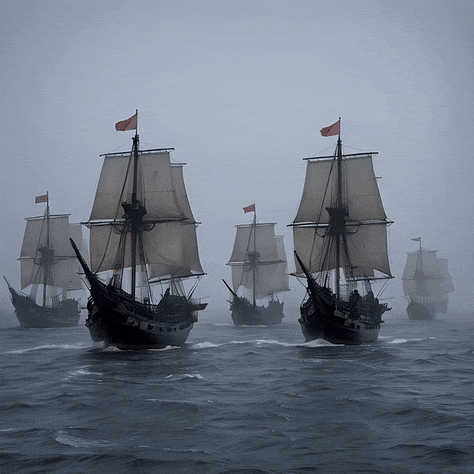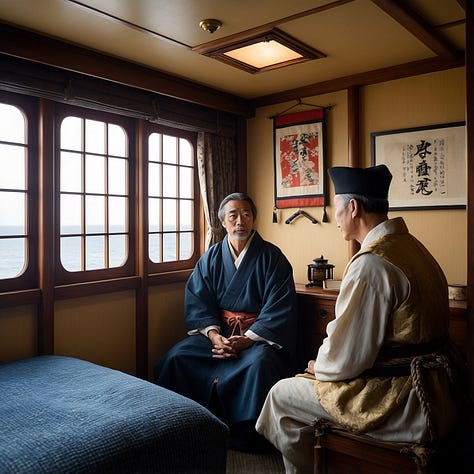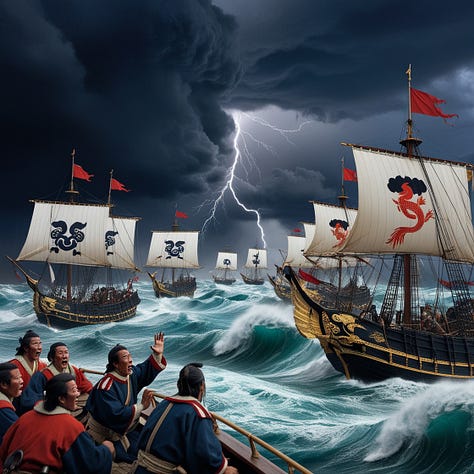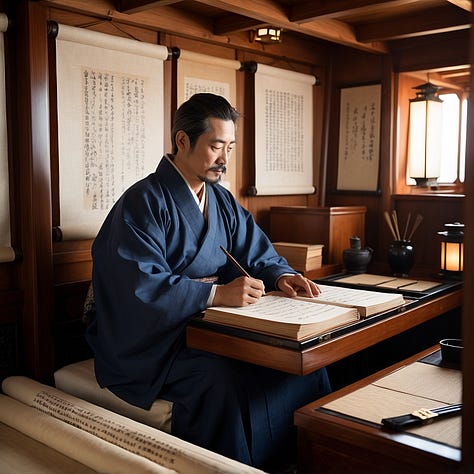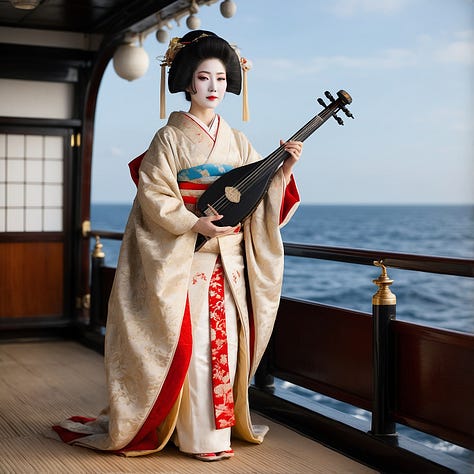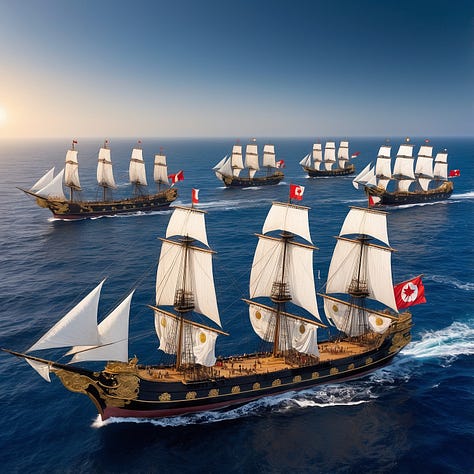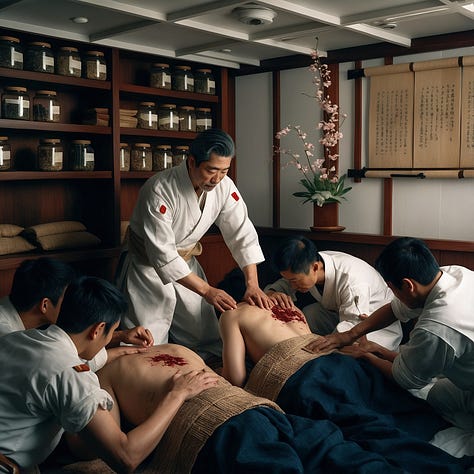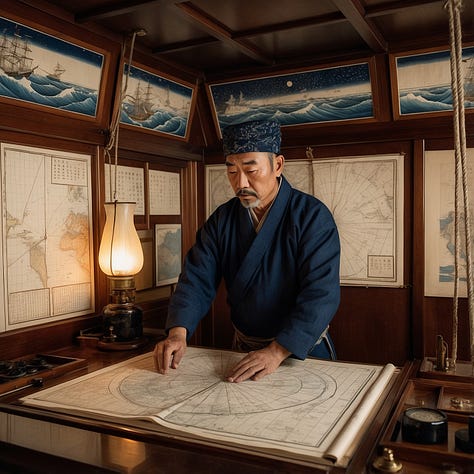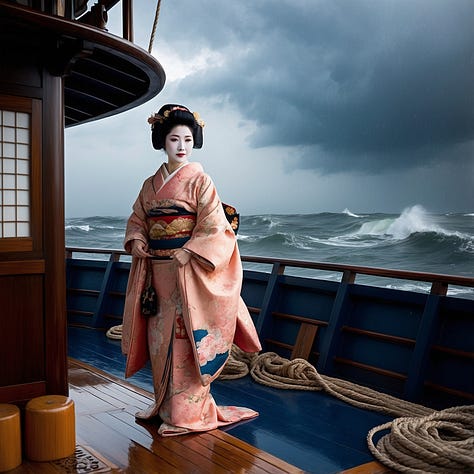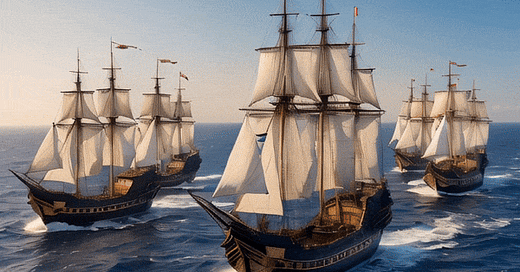The fleet cut through the vast, uncharted waters of the Indian Ocean, a testament to the bold vision of the Japanese Empire. The flagship, "Tenka Fubu," led the way with its sleek design and formidable size, a marvel of maritime prowess. As the fleet rounded the cape known to them as "Kaminari Misaki," or Thunder Cape, the sea transformed beneath them. Here, where the waters of the Atlantic and Indian Oceans collided, the currents were strong and unpredictable, and the wind carried the scent of far-off lands and untold adventures.
Admiral Takahashi Hiroshi stood at the bow of the "Tenka Fubu," his gaze fixed on the endless horizon. The weight of the expedition bore down on his shoulders, a mixture of pride and immense responsibility. It had been Emperor Go-Hanazono himself who had entrusted Takahashi with this mission, chartered to seek a sea route to Ōshū, the Japanese word for Europe. This task was born from a vision, a belief that the empire could expand its reach to the distant lands of the West.
Despite skepticism and opposition from many of his rivals, who favored overland routes through the Red Sea to the Mediterranean or ventures across the Pacific, Takahashi had remained resolute. The Emperor's unwavering faith in him had been a beacon of hope. Go-Hanazono’s otherworldly wisdom and seemingly infallible judgment had earned Takahashi’s unquestioning loyalty, a loyalty that had been tested but never wavered.
He recalled the day in the Imperial Court when the Emperor had bestowed upon him this monumental task. The grand hall was filled with the finest lords and advisors of Japan. Emperor Go-Hanazono, a young man in his early thirties, stood before them. His regal bearing was enhanced by elaborate robes and the gleaming imperial crown.
"Across the vast and boundless sea, where the sun rises and never sets, we shall find new lands and opportunities. We must secure resources, spread our influence, and ensure that Japan stands unchallenged," the Emperor declared, his voice powerful and poetic.
The Emperor's speeches revealed wisdom and foresight beyond his years, inspiring loyalty and admiration among his subjects. Despite his idealism and ambition, moments of self-doubt occasionally flickered in his eyes, hinting at the immense pressure he faced as the leader of a burgeoning empire. But he never showed these doubts to his followers, maintaining an aura of divinity and absolute certainty that commanded absolute obedience.
The fleet itself was a marvel of organization and forethought, a testament to the meticulous planning of the Emperor and his advisors. Comprised of ten ships, each with a specific role, the fleet was designed to establish a self-sustaining colony on the shores of Europe. Alongside the "Tenka Fubu" were the "Ryuujin," a heavily armed warship named after the dragon god of the sea, and the "Amaterasu," a grand vessel dedicated to the sun goddess, equipped with advanced navigation tools and astronomical instruments.
There were also three "kawabune" transport ships, each carrying supplies necessary for establishing the colony: seeds, livestock, and tools for agriculture and construction. These ships were followed by two "kaizoku" ships, smaller and faster vessels designed for scouting and rapid communication. The "Mikazuki," a ship named for its crescent moon-shaped sails, carried artisans and craftsmen, ready to build the infrastructure of the new settlement.
Two additional ships, the "Shogunmaru" and the "Ningyo," were equipped with medical supplies and personnel, ensuring the health and well-being of the colonists. The "Shogunmaru" also housed the fleet's theological advisors and scholars, including a contingent of monks and Shinto priests tasked with spreading the Emperor’s divine mandate.
The plan was clear and ambitious. Upon reaching the shores of Europe, they would first secure a strategic coastal location. The "Ryuujin" and the "Amaterasu" would protect the landing while the transport ships unloaded supplies. The artisans aboard the "Mikazuki" would then construct defensive fortifications, followed by agricultural fields and living quarters. Within a few months, the colony would be self-sustaining, a beacon of Japanese civilization amidst the barbaric lands of Europe.
However, the challenges were immense. The great unknowns of the journey weighed heavily on the crew. The treacherous waters of Kaminari Misaki were only the beginning. They faced unpredictable weather, potential conflicts with native tribes, and the logistical nightmare of maintaining supplies during the long voyage. Moreover, the Europeans themselves, whom the Japanese regarded as warlike barbarians, presented a significant threat. Their history of internecine warfare and brutal conquests was well-documented, painting them as uncivilized and unworthy of the lands they controlled.
"Do you think we’ll really see sea monsters?" a young recruit asked a grizzled, scarred veteran as they secured the rigging.
"I've been on many voyages, lad, and seen strange things. But it's not monsters you should fear; it's the unknown," the veteran replied, tightening a knot with practiced ease.
General Masaru Saito, a stoic and imposing figure, patrolled the deck, maintaining order and discipline. His presence commanded respect, but his strict demeanor added to the crew's anxiety. He stopped briefly to address the sailors, his voice stern but reassuring.
"Remember, discipline and unity will see us through any storm," he said.
Among the crew were several geishas, their presence a strategic move by the Empire. These women were not only entertainers but skilled diplomats, trained to navigate the complexities of foreign courts. They wore elaborate kimonos, their faces painted with the delicate art of nihonga, and moved with a grace that captivated all who saw them. One of them, Hoshino Akemi, was particularly renowned for her linguistic abilities and her talent with the koto, a traditional stringed instrument. Her role was to charm and negotiate, to learn the languages and customs of the people they encountered, and to forge alliances beneficial to the Empire.
Akemi often found herself in the company of the ship's scribe, Nakamura Kenji. Kenji was a young man with a keen intellect and a passion for knowledge. He was tasked with documenting the voyage, recording not only the events but also the customs and practices of any foreign cultures they encountered. Kenji and Akemi would spend hours in the evenings, discussing the possibilities that lay ahead, the excitement of discovery mingling with the fear of the unknown.
"Do you ever wonder what Ōshū will be like?" Kenji asked one night as they sat under the stars, the gentle rocking of the ship a soothing counterpoint to the vast, open sky above them.
"I imagine it as a place of great mystery and beauty," Akemi replied, her eyes reflecting the starlight. "A land of ancient knowledge and new opportunities. But I also know that it will be challenging. Our ways are so different from theirs. We must be prepared for anything."
The camaraderie among the crew was palpable, a mix of respect and mutual reliance. Takahashi had forged a tight-knit group, understanding that their survival depended on their unity. He often consulted with his lieutenants, men like Captain Ito Daichi, a seasoned sailor with a reputation for his strategic mind and calm demeanor in the face of danger. Ito's insights were invaluable, his experience a steadying force in turbulent times.
As the fleet sailed past Kaminari Misaki, the waters grew rougher. The Cape was notorious for its treacherous currents and unpredictable storms, and many a sailor's tale spoke of ships lost to its fury. Admiral Takahashi ordered the crew to brace themselves, knowing that their survival depended on their skill and unity.
"Reef the sails! Secure the cargo!" His voice rang out over the howling wind, calm and authoritative. The crew moved with practiced efficiency, their actions a testament to their training and discipline.
The sky darkened, and the wind picked up, transforming the tranquil sea into a churning cauldron. Massive waves crashed over the deck, and thunder cracked ominously overhead. Lightning illuminated the terrified faces of the crew, but Takahashi's calm demeanor and decisive actions inspired confidence.
A particularly violent wave crashed over the deck, sweeping several sailors overboard. Without hesitation, Takahashi ordered a daring rescue operation. Ropes were thrown, and men strained against the pull of the sea to save their comrades. Amidst the chaos, Hoshino Akemi emerged from below deck. Despite the danger, she moved with determination, assisting where she could, demonstrating her resourcefulness and courage.
As dawn broke, the storm subsided, leaving the fleet battered but intact. The crew, exhausted yet relieved, began to assess the damage. Admiral Takahashi stood at the bow once more, reflecting on the ordeal. He was grateful for their survival but aware of the challenges that still lay ahead.
Gathering the crew, Takahashi addressed them. "We have faced the fury of the sea and emerged victorious. Let this be a testament to our resilience and unity. We must remain vigilant, for our journey has only just begun."
He gazed once more towards the horizon, knowing that greater trials awaited them as they ventured further into unknown waters. The sun rose again, casting its light on the determined faces of the crew, ready to face whatever came next.
Below deck, the atmosphere was a mixture of relief and preparation. The ship's doctor, Dr. Yamada Kaito, moved among the injured sailors, tending to their wounds with a practiced hand. Dr. Yamada was a man of quiet strength, his gentle manner calming even the most fearful. He had joined the expedition out of a sense of duty and curiosity, eager to learn from the medical practices of other cultures and to bring that knowledge back to Japan.
In the galley, the ship's cook, Aoki Shun, prepared a meal to lift the crew's spirits. Aoki was known for his ability to create delicious meals from limited supplies, his culinary skills a source of comfort for the weary sailors. He moved with a practiced efficiency, his hands deftly slicing and stirring, the aroma of his cooking a welcome distraction from the recent storm.
As the crew settled into their routines, the ship's navigator, Fukuda Haruto, studied the maps and charts spread out before him. Haruto was a meticulous man, his knowledge of the stars and currents unparalleled. He had been instrumental in guiding the fleet through the treacherous waters of Kaminari Misaki, and his calm, analytical mind was a steadying influence on the crew.
In the quiet moments of the journey, Admiral Takahashi often found himself in the company of a most unusual passenger: a Christian captive named Thomas. Thomas was a Portuguese merchant who had been captured during a skirmish off the coast of India. Takahashi had ordered that he be treated well, seeing an opportunity to learn more about the Kirishitan, or Christian, religion that had begun to take root in Japan.
"Tell me more about your God," Takahashi asked one evening, his curiosity piqued by the stories he had heard.
Thomas, a thin, wiry man with a sharp mind, spoke with the fervor of a true believer. "Our God is a god of love and mercy, who sent His son to save humanity from sin. We believe in forgiveness, in turning the other cheek, and in the promise of eternal life."
Takahashi listened intently, intrigued by the concept of monotheism, so different from the polytheistic beliefs that dominated Japanese spirituality. "And how do you practice this faith?"
Thomas explained the rituals and sacraments, the prayers and the hymns, painting a picture of a religion that emphasized community and compassion. Takahashi found himself both fascinated and skeptical. The idea of a single, all-powerful deity was foreign to him, yet there was something compelling about the simplicity and purity of the Christian faith.
In the Emperor’s grand plan, the incorporation of new spiritual ideas was not just a possibility but a necessity. The Empire was evolving, its people increasingly looking toward new spiritualities and theological concepts. The Emperor, an enigmatic figure whose behavior could only be explained by supernatural means, seemed to encourage this exploration. Go-Hanazono often spoke in riddles and poems, his words imbued with a wisdom that transcended human understanding.
"Through the fog and storm, the path is revealed,
To lands where the sun sets and dreams are sealed.
In faith and unity, we find our way,
To the dawn of a new and glorious day."
The Emperor's words echoed in Takahashi’s mind, a constant reminder of the divine mission they were undertaking. The Keeper's guidance was unquestionable, his decisions always proving to be right, no matter how inscrutable they seemed at first.
As the fleet sailed on, they encountered other challenges that tested their resolve. The unpredictable weather of the Atlantic Ocean, the scarcity of fresh water, and the constant need for repairs on the ships kept everyone on edge. The crew worked tirelessly, their unity and discipline the only things that kept the expedition from falling apart.
One evening, as the fleet sailed under a canopy of stars, Takahashi called a meeting of his key officers and advisors in the captain’s cabin. The air was thick with the scent of incense, a small shrine to the Emperor dominating one corner of the room. The soft light from lanterns cast long shadows, giving the gathering a solemn, almost mystical atmosphere.
"We are approaching the final leg of our journey," Takahashi began, his voice steady but filled with a quiet intensity. "We must prepare for our landing. Captain Ito, I want you to lead the reconnaissance team. Find us a suitable location to establish our colony. We need a defensible position with access to fresh water and arable land."
Captain Ito nodded, his expression one of determination. "I will assemble the team immediately, Admiral. We will find the perfect spot."
"General Saito," Takahashi continued, turning to the stern-faced military leader, "prepare the soldiers for immediate deployment upon landing. We must secure the area and protect our people from any potential threats."
General Saito’s eyes flashed with resolve. "It will be done, Admiral. We will be ready."
"Hoshino Akemi," Takahashi said, addressing the diplomat, "once we have established a foothold, I want you to make contact with the local leaders. Use your skills to gather information and begin negotiations. We must understand our enemies if we are to conquer them."
Akemi bowed her head slightly, her expression serene yet focused. "I will do my best to ensure our success, Admiral."
As the meeting concluded, the officers dispersed to carry out their tasks, each one driven by a sense of purpose and the weight of their mission. Takahashi remained in the cabin, his thoughts heavy with the responsibility he bore. The Emperor’s words echoed in his mind, a reminder of the divine mandate that guided their journey.
The journey west had begun, and there was no turning back. The Emperor's vision for Japan rested upon their shoulders, and they would stop at nothing to ensure its realization. Each member of the crew, from the highest-ranking officer to the youngest recruit, was united in their purpose. They were bound by a shared destiny, a collective dream of discovery and conquest.
The fleet sailed on, the horizon ever beckoning, the promise of new lands and new opportunities driving them forward. They were explorers and warriors, diplomats and scholars, bound together by a vision of greatness. As the sun set on the distant horizon, the "Tenka Fubu" cut through the waves, a symbol of Japan's indomitable spirit and unyielding resolve.
